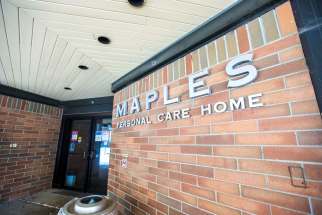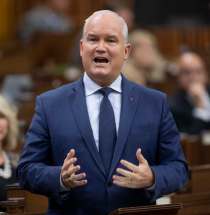Contact tracing job application confusion decried
Read this article for free:
or
Already have an account? Log in here »
To continue reading, please subscribe:
Monthly Digital Subscription
$0 for the first 4 weeks*
- Enjoy unlimited reading on winnipegfreepress.com
- Read the E-Edition, our digital replica newspaper
- Access News Break, our award-winning app
- Play interactive puzzles
*No charge for 4 weeks then price increases to the regular rate of $19.00 plus GST every four weeks. Offer available to new and qualified returning subscribers only. Cancel any time.
Monthly Digital Subscription
$4.75/week*
- Enjoy unlimited reading on winnipegfreepress.com
- Read the E-Edition, our digital replica newspaper
- Access News Break, our award-winning app
- Play interactive puzzles
*Billed as $19 plus GST every four weeks. Cancel any time.
To continue reading, please subscribe:
Add Free Press access to your Brandon Sun subscription for only an additional
$1 for the first 4 weeks*
*Your next subscription payment will increase by $1.00 and you will be charged $16.99 plus GST for four weeks. After four weeks, your payment will increase to $23.99 plus GST every four weeks.
Read unlimited articles for free today:
or
Already have an account? Log in here »
Hey there, time traveller!
This article was published 27/10/2020 (1869 days ago), so information in it may no longer be current.
There was no talk of a looming pandemic when Sharon Irwin retired from nursing at the end of February.
Now, seven months into a COVID-19 response that has strained health-care systems, Irwin wants to join in the fight. However, the application process, she says, is a hassle.
Irwin applied this week to become a contact tracer, after spending 42 years working as a nurse in Winnipeg.
“I think they could have simplified the process,” she said, after spending a few hours on the online form.
As Manitoba relies on external agencies to meet its contact tracing demands, Irwin is questioning whether there are too many barriers to enabling health-care workers who are already in the province to do the work.
Manitoba requires people working as contact tracers or in its COVID-19 call centre to have a degree or diploma as a licensed practical nurse, registered nurse, occupational therapist, physiotherapist or social worker.
However, the province’s contact tracing job posting didn’t appear to be tailored to the urgent needs of the position.
“I’m a down-to-earth, common sense-type person, and to fill out some of this stuff that’s not even applicable to the job I’m doing — if a (Statistics Canada) contact tracer or a Red Cross worker can come in, they don’t need the Manitoba registrations, so why do I need the Manitoba nursing registration?” Irwin said.
“I think they could have simplified the process.”
– Sharon Irwin
Manitoba is contracting the Canadian Red Cross and StatsCan to carry out contract tracing work that was previously borne solely by public health nurses in the province. The provincial government still hasn’t been able to pinpoint the number of contact tracers it has in Manitoba.
Health Minister Cameron Friesen said Tuesday the province is working every day to meet demand and increase Manitoba’s contact tracing capabilities.
In April, the province agreed to cover costs associated with the re-registration required for retired nurses and other health professionals to return to work. However, that message didn’t reach Irwin, who assumed after reading the application she’d have to pay registration fees on top of the costs of obtaining up-to-date criminal record, child abuse registry and vulnerable-sector checks.
She’s not the only one, the Manitoba Nurses Union says.
Union president Darlene Jackson said she’s heard from several nurses who didn’t know how to apply to be contact tracers. The government hasn’t properly communicated about the fact it is covering the cost of liability insurance, and registration fees are temporarily waived, for retired health-care workers or those who’ve let their licences lapse, Jackson said.
MNU has been advocating for weeks for a fast-tracked application system for health-care workers.
“That has fallen on deaf ears, it hasn’t been taken into consideration, and nurses are getting frustrated… We do have nurses that have re-registered with the College (of Registered Nurses of Manitoba) that really want to help with COVID, but don’t know how to get into the system,” Jackson said.
“I think it’s shameful… we knew that the second wave was going to be worse than wave one, and it surely is. This government had the entire summer (to prepare.)”
– Nurses union president Darlene Jackson
“I think it’s shameful… we knew that the second wave was going to be worse than wave one, and it surely is. This government had the entire summer (to prepare.)”
Meanwhile, public health nurses have been conducting contact tracing on top of regular duties, and the province’s contact tracing computer system isn’t user-friendly, the union said, flagging that nurses have to make manual notes about who to call and when to follow-up, because the system doesn’t allow for automatic reminders.
Jackson confirmed public health nurses are the only people doing contact tracing work in Manitoba — apart from outside workers via Red Cross and StatsCan — but said the union has no firm number on how many are involved.
In a statement Tuesday, Shared Health thanked all applicants for their interest, and said it still needs health-care workers to do a variety of front-line work, particularly in personal care homes.
katie.may@freepress.mb.ca
Twitter: @thatkatiemay

Katie May is a general-assignment reporter for the Free Press.
Our newsroom depends on a growing audience of readers to power our journalism. If you are not a paid reader, please consider becoming a subscriber.
Our newsroom depends on its audience of readers to power our journalism. Thank you for your support.
History
Updated on Tuesday, October 27, 2020 9:38 PM CDT: Fixes headline






